Letter from Spain #21
'Amnesty' and the Catalan 'political conflict' ... plus TBC notes & research
Monday 11 September is the National Day of Catalonia (‘La Diada’), and as Catalonia and Carles Puigdemont have been in the news again this week, I thought I’d write a few words about how I see this whole so-called ‘political conflict between Spain and Catalonia’, and how it can be (and should have been) easily resolved. But then I had a déjà vu moment, because I realised I’ve written about all this before … and I was right about it the first time.
In a previous blog I used to write over on my own website, which I called ‘Un Observador Inglés’, I wrote a lot about Catalonia. It started with Un observador inglés (1) – Rajoy is inept and Spain’s lost its mojo - because I wanted to express my feelings and anger about what I witnessed on 1 October 2017, the day of the ‘illegal’ referendum in Catalonia.
My take on it all from the very start (although there are many people who disagree with me) is that things should never have escalated to the level they did, that the Spanish prime minister at the time, Mariano Rajoy, and his right-wing People’s Party (PP) government, were totally inept, and it was that ineptness and heavy-handedness that drove the Catalan independence movement to become the force that it became in the first place.
As I wrote in that first blog post, Rajoy ‘never used “politics” to try and resolve the Catalan issue at all. He’s simply used the judges and the courts … and continues to do so’ - as do the far-right Vox party nowadays. But it’s not just déjà vu, because if Spain’s not careful then I can see it happening all over again.
Just to clarify something here: I don’t support Catalan independence, although I understand why many Catalans seek it. The madness of Brexit finally made things loud and clear to me. Also, I don’t believe that an independent Catalonia would be better off, economically. Back in 2017, no one convinced me that it would be, and they have failed to do so ever since. The financial support from the EU during and post-Covid also made that loud and clear, as I believe it would have been funding that an independent Catalonia would have missed out on.
What I do support, however, is the right to vote - or at least the right to have voted back in October 2017 without being beaten up by military-style police.
All the current political problems and issues in Catalonia - or rather, that specific push for independence that last culminated in the 2017 ‘illegal’ referendum - all started with Spain’s Constitutional Court making amendments to the Catalan Statute of Autonomy back in 2010, seven years earlier, and that was all thanks to the PP campaigning against the statute and challenging the text of it in court.
Before 2010, there weren’t so many people favouring Catalan independence – not until Spain’s Constitutional Court watered down the Catalan statute. Since then, and especially up until 2019, there’s been anything between one and two million people taking to the streets every 11 September for Catalonia’s national day, demanding it.
I see the issue as being quite simple. Rajoy made the 2017 referendum ‘illegal’. He criminalised it. A stupid thing to do, when in fact he should have just ignored it. He should have let the Catalans vote in their pseudo-referendum, but simply ignored the results of it - as the rest of the EU would have done. Instead, he sent the police to beat up voters, and it made front-page headlines worldwide, and for weeks thereafter. It put Catalonia and the Catalan ‘issue’ of autonomy on the map.
Worse ‘politics’ from Rajoy followed. Nine Catalan politicians and activists were then jailed for between 9-13 years by the Spanish Supreme Court in October 2019, convicted of ‘sedition’ and misuse of public funds for their role in the 2017 ‘illegal’ referendum, with the verdicts causing even more widespread protests across Catalonia.
Then we got a change of government in Spain, and in June 2021, the nine walked free from prison, following pardons granted by the socialist government led by Pedro Sánchez … and which totally defused the Catalan ‘political conflict’.
You get my drift?
The pardons, of course, provoked outrage and protests from the right-wing and far-right parties in Spain, but I repeat: they defused the conflict.
I believe the pardons were correct, because I believe the 2017 referendum should never have been illegal. It should have just been ignored.
And now? We have a situation in Spain where the former president of Catalonia at the time of the 2017 referendum, the exiled MEP Carles Puigdemont, is demanding ‘amnesty’ for hundreds of Catalan activists and politicians who are still facing legal action over that failed 2017 independence bid - himself included. He’s demanding it in return for his Junts per Catalunya (JxCat) party giving its crucial backing for Sánchez to be sworn in for another term, after an inconclusive general election on 23 July.
The right-wing and far-right groups are in uproar again - for two reasons. One, they consider Sánchez is more obsessed with remaining in power than ‘breaking up Spain’ (although Spain being broken up isn’t really going to happen). Secondly, by granting ‘amnesty’ to the likes of Puigdemont further underlines their outrage at the pardons granted to those who were already in jail for the 2017 referendum: it will be ‘decriminalising’ that referendum … which I don’t believe should have been a criminal act in the first place.
By granting an ‘amnesty’ to the pro-independence Catalan activists and politicians, it will mean that (1), yes, Sánchez can become prime minister again … but I believe he can do a better job than any PP leader can ever do, as he’s shown it for the last four years. That’s my personal opinion (obviously). By granting an ‘amnesty’ it will also mean that (2), the Catalan issue will be defused even more … although they will still need to look at the finer print of the Statute of Autonomy in due course.
I’m hoping for the best, but as I’ve written before in the ‘observador inglés’ blog post, politics in Spain is as polarised as it is in the USA, and it goes around in circles …
The Barcelona Connection - Research
For those of you following this blog’s research and the locations behind The Barcelona Connection … Chapter 21 takes place at the Museu Nacional d’Art de Catalunya (MNAC).
As I have written in the acknowledgments section in the book, I am very grateful to Pedro de Llobet and Benoît Vincens de Tapol from the department of restoration and conservation at MNAC, and who very kindly gave me their time and shared their expertise with me, when I visited their offices back in April 2013.
Benoît helped me with some crucial research on the different methods of ‘getting below the surface of a painting’, and what might be visible depending on the method used. Pedro and his family have become dear friends to me over the years, and Pedro Pardina in the book - cheerful as ever in his white lab coat greeting Benjamin - is really Pedro de Llobet. Below are some photos from that day …
Next week Chapter 22 and the Plaça Sant Jaume, and some more on Nîmes in Chapter 24 (with some better photos than last week’s post about Nîmes).

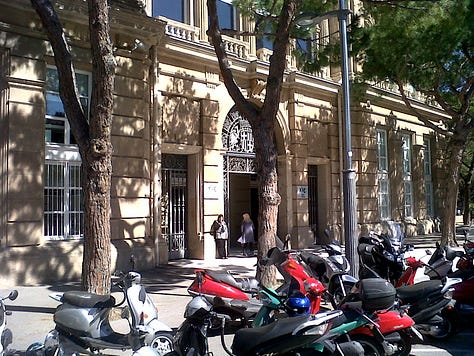
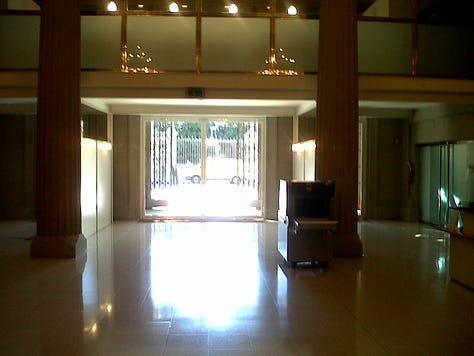
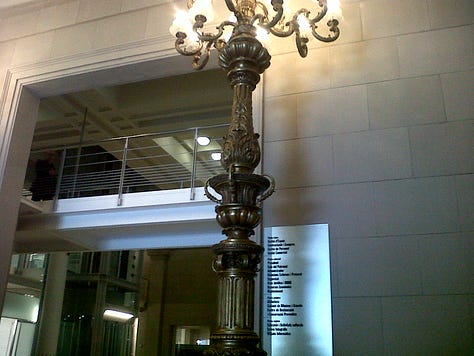
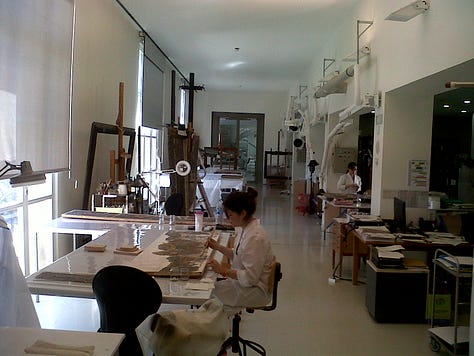
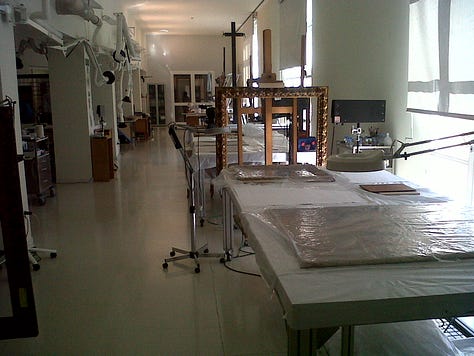
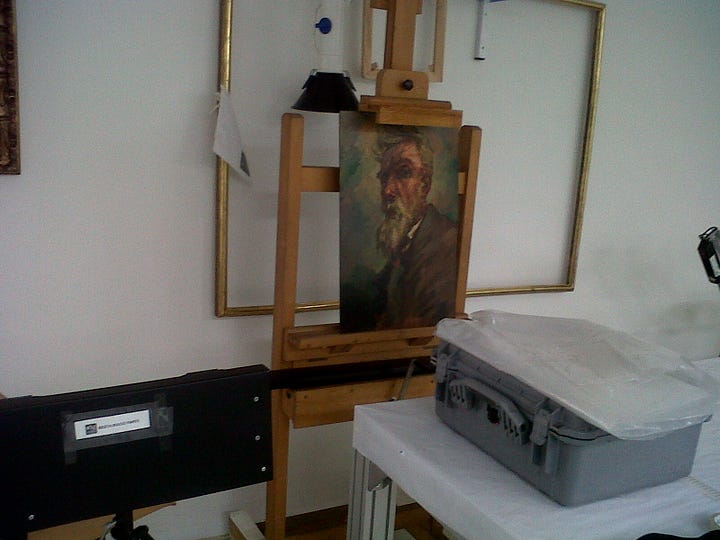
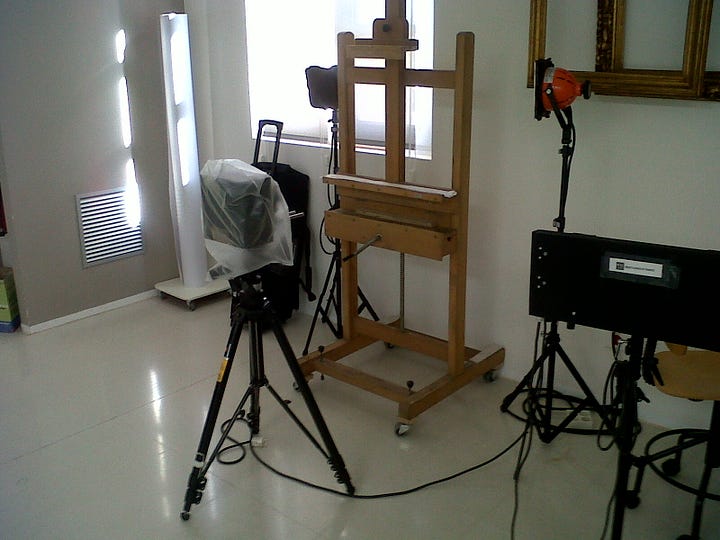
Previous links to my research notes are here:
Chapter 18 in Letter from Spain #20 (Nîmes)
Chapter 16 in Letter from Spain #19 (Marta Soler visiting the offices of La Vanguardia)
Chapter 15 in Letter from Spain #18 (Sants, Les Corts and the Plaça de la Concòrdia)
Chapter 14 in Letter from Spain #17 (introducing Inspector Vizcaya and Marta Soler).
Chapter 13 in Letter from Spain #16 (the painting - the possible study of The Hallucinogenic Toreador by Salvador Dalí).
Chapters 10 and 12 in Letter from Spain #15 (Isabel Bosch and Lieutenant Trias).
Chapters 8 and 11 in Letter from Spain #14 (Benjamin at Girona Airport and finding the Marqueses’ home in La Bisbal).
Chapter 7 in Letter from Spain#12 (Séverin and Jürgen).
Chapter 5 in Letter from Spain#11 (Elena in Girona).
Chapters 3-4 in Letter from Spain#9 (Marcos Constantinos in Hampstead, plus Benjamin at the UEA & Stansted).
Chapter 2 in Letter from Spain#8 (the home of the Marqueses de Guíxols, not far from La Bisbal d’Empordà).
Chapter 1 in Letter from Spain#7 (Benjamin waking up at the service station).
The Barcelona Connection - Reviews, News & Events
On Thursday 28 September, I’m doing an event at The Secret Kingdoms bookstore in Madrid, chatting about The Barcelona Connection and A Load of Bull with Ann Louise Bateson, radio producer, former BBC contributor and presenter of the English language programme, ‘Madrid Live’.
Drinks and snacks will also be served, and although the event is free, places will be limited - so if you’re interested in coming along, then it would be wise to reserve your place by clicking on this Eventbrite link. It will be a fun evening and I hope to see you there!
Another date for the diary, this time in Barcelona. On Saturday 28 October at 2.30pm, I will be participating in a roundtable discussion hosted by Barcelona City Council for their annual International Community Day, with the topic being ‘Discovering & Enjoying Barcelona through Literature’. The event will take place at the Museu Marítim de Barcelona. More details in due course.
As soon as I have news about a possible event at The Salvador Dalí Museum in Florida, I will post details about it here.
Links to reviews & articles
Here’s the link for a review of The Barcelona Connection that came out in La Revista, a publication of the British-Spanish Society.
Here’s a link to a review of the book published by the Spain in English online newspaper.
Here’s the link to an article I was asked to write for The Art Newspaper about my research on Salvador Dalí.
You can also click here for the latest reviews on Amazon, as well as on Goodreads and at Barnes & Noble.
The book is available on Amazon or you can also click here to choose where else to order your copy from. It can also be ordered from any bookshop simply by giving the ISBN number: 978-1-7393326-1-7.
For professional enquiries and foreign rights for The Barcelona Connection, please contact my agent Justyna Rzewuska at the Hanska Literary & Film Agency.




